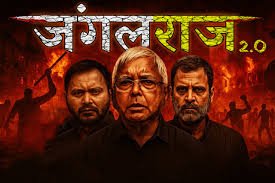Persistent crime and perceptions of a corrupt bureaucracy and equally corrupt BJP and JD(U) leaders highlight the disconnect between the NDA’s campaign and voter priorities.
Navin Upadhyay
October 25, 2025 – As Bihar approaches a pivotal assembly election, the ruling BJP-JD(U) alliance is confronting a mounting credibility crisis on the crime and corruption front. While both parties continue to campaign heavily on these issues, recent developments suggest that this strategy may fall flat with voters, especially first-time voters who have no memory of the so-called “Jungle Raj” during the Lalu-Rabri era. Instead, contemporary concerns over governance, persistent crime, and alleged corruption among current leaders are increasingly shaping the electorate’s priorities.
The BJP’s narrative has taken a hit after it inducted Anil Kumar Sahani, a former Rajya Sabha MP convicted in 2022 for the Leave Travel Concession (LTC) fraud, into the party. Sahani was disqualified from the Bihar Legislative Assembly following his conviction and officially joined the BJP on October 22, 2025, in Patna in the presence of senior leaders. Critics argue that this move undermines the party’s anti-corruption credentials, portraying electoral arithmetic as taking precedence over governance ethics.
READ: “Who is the MP Named in the Satara Doctor’s Explosive Suicide Note?”
The Credibility Gap
The induction of Sahani, largely seen as an attempt to consolidate the Nishad community vote in parts of Muzaffarpur and adjoining districts, highlights a strategic-cum-ethical dilemma for the BJP. Political observers say the move sends a mixed message: a party preaching zero tolerance for corruption while welcoming convicted politicians risks alienating voters who expect accountability.
According to political analysts, Bihar’s bureaucracy is widely viewed as one of the most corrupt in India. Journalists and political watchdogs frequently cite manipulation of government contracts, and opaque administrative practices as symptomatic of entrenched corruption. This adds another layer of complexity: even if the BJP attacks past governments, voters may perceive current governance as equally compromised.
VIDEO | Samastipur: Prime Minister Narendra Modi (@narendramodi) addresses a public rally, saying, “…You cannot expect law and order when there is RJD. Their ‘Jungle Raj’ has destroyed generations of Bihar. Mothers, sisters, women, youth, and backward communities are the… pic.twitter.com/0SLXvUnaIh
— Press Trust of India (@PTI_News) October 24, 2025
Allegations Against Current Leaders
Prashant Kishor’s Jan Suraaj campaign has targeted top BJP and JD(U) leaders with detailed, document-backed allegations:
- Samrat Choudhary (Deputy CM, Bihar BJP) – accused of holding a fake D.Litt degree, changing his name multiple times, and involvement in a 1998 murder case. Discrepancies in election affidavits have further fueled questions about his credibility.
- Ashok Choudhary (JD(U) senior leader) – allegedly acquired land and assets worth around ₹200 crore through transfers involving family members and trusts. Kishor claims these transactions involve benami deals and abuse of political influence.
- Sanjay Jaiswal (MP, West Champaran) – linked to fraudulent petrol vouchers for government reimbursements. Complaints about this date back several years but were reportedly buried due to his political clout.
- Dilip Jaiswal (BJP state president) – alleged to have orchestrated the illegal takeover of Mata Gujri Memorial (MGM) Medical College, diverting funds and manipulating university recognition for personal and political gain. Over 50 children of politicians were reportedly admitted without exams under his influence.
- Mangal Pandey (Health Minister, Bihar) – accused of accepting a ₹25 lakh bribe connected to the MGM Medical College deal and overpayment in ambulance procurement (1,222 vehicles).
These allegations paint a picture of institutional capture, nepotism, and quid-pro-quo arrangements, severely denting the NDA’s image as a pro-clean governance alliance.
Bihar’s Crime Reality
While the BJP emphasizes past crime under the RJD, Bihar’s contemporary crime scenario is equally alarming:
- Murders: 2,930 cases in 2022, slightly declining to 2,862 in 2023. Major triggers include land disputes, family quarrels, love affairs, and dowry deaths.
- Sexual Violence: 1,106 rape cases reported in the first nine months of a prior year; crimes against women rose 16.3% between 2018–2022.
- Overall Crime: 353,502 IPC and SLL cases registered in 2023, with a charge-sheeting rate of 83.5%. While investigation follow-up is relatively strong, convictions and preventive interventions remain weak.
Analysts cite overstretched police, socio-economic stress, and dense population as contributing factors. But they also highlight a systemic issue of corruption within the administration, which hampers proactive crime prevention.
Leadership Vacuum and Political Implications
The BJP’s crisis is compounded by a leadership vacuum. The passing of stalwarts like Sushil Modi, sidelining of senior leaders, and reliance on a “second-rung” cohort with transactional connections rather than deep Sangh Parivar grooming weakens its ability to counter allegations effectively.
With allegations piling up, including fraudulent degrees, land scams, and bribery, the NDA faces a dilemma: defending its record risks appearing defensive, while ignoring the claims risks further erosion of voter trust.
Why Crime and Corruption Messaging May Backfire
- First-time voters have little memory of the “Jungle Raj”; their concerns are rooted in present-day governance and safety.
- Induction of convicted politicians and ongoing allegations against leaders may make anti-corruption rhetoric ring hollow.
- Public perception of a corrupt bureaucracy adds to the credibility deficit, making voters more likely to judge parties by current performance rather than historical comparisons.
The BJP-JD(U) alliance’s reliance on crime and corruption narratives about past governments may yield diminishing electoral returns in 2025. With contemporary crime persisting at high levels, widespread allegations of corruption among current leaders, and a leadership vacuum in the state party, the electorate is increasingly focused on real-time accountability and governance.
For the NDA, the challenge is clear: ethical credibility, transparent leadership, and effective governance may matter more than nostalgic political narratives. The induction of figures like Anil Kumar Sahani underscores the tension between electoral pragmatism and integrity—a test that will define Bihar’s political landscape this election.














